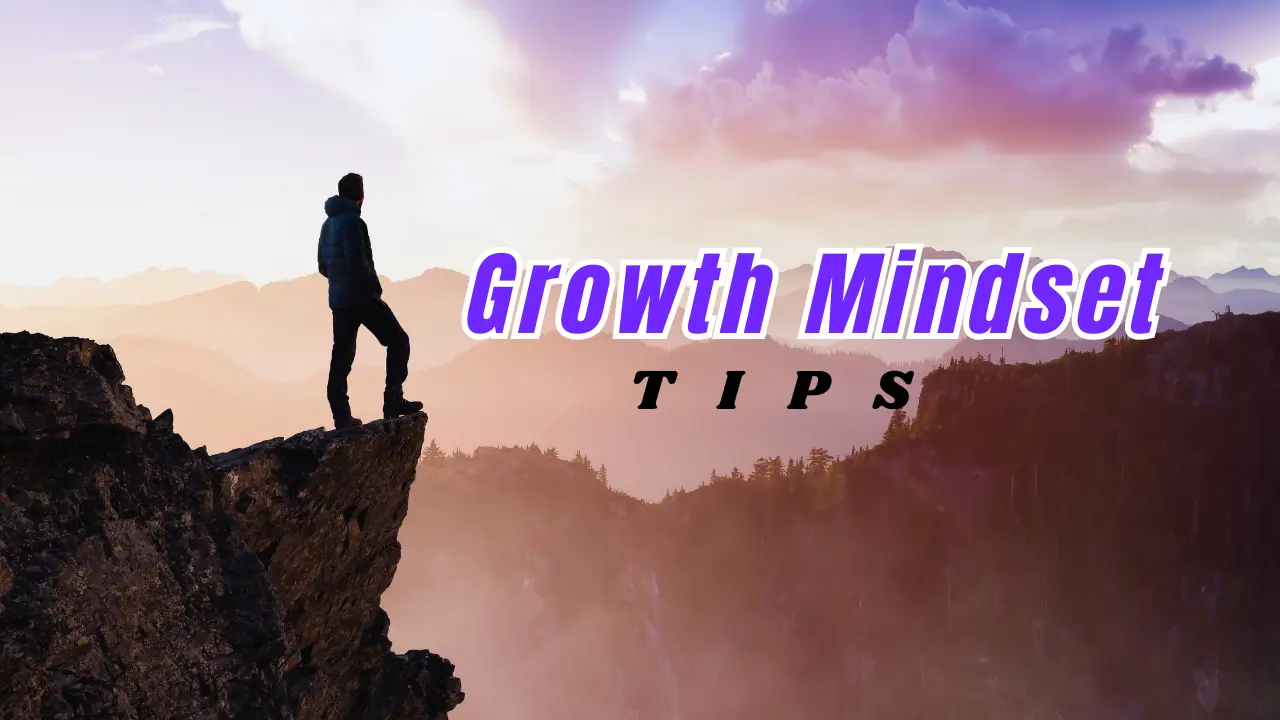Growth Mindset: 10 Powerful Tips to Develop It

Introduction
Developing a growth mindset can change the way you view challenges, failure, and even yourself. Have you ever caught yourself thinking, “I’m just not good at this” or “Maybe I’m not meant for this”? If so, you’re not alone. Many of us grow up believing that our abilities, intelligence, or talents are fixed—either you have it, or you don’t. But science says otherwise. In reality, your brain is far more flexible and trainable than you think. That’s where the idea of a growth mindset comes in.
A growth mindset helps you see challenges as opportunities and failures as stepping stones. It’s the opposite of a fixed mindset, which tends to shut you down when things get tough. The good news? You can develop a growth mindset—and with a few intentional habits, you can transform the way you think, feel, and approach life.
What Is a Growth Mindset?
A growth mindset is the belief that your talents, intelligence, and emotional abilities are not set in stone. It’s about understanding that you can learn and grow through effort, feedback, and persistence. This term was introduced by Dr. Carol Dweck, a Stanford University psychologist, who found that how we think about our abilities shapes how far we go in life.
People with a growth mindset are more likely to embrace challenges, persevere after failure, and find joy in learning. On the other hand, those with a fixed mindset may avoid challenges out of fear of failure or judgment.
Why Growth Mindset Matters for Mental Health
Before jumping into the tips, let’s look at why developing a growth mindset is crucial for your mental health:
- It reduces anxiety by shifting your focus from perfection to progress.
- It helps manage stress by encouraging you to learn from mistakes rather than fear them.
- It builds self-confidence and emotional resilience.
- It makes you more adaptable in relationships, work, and everyday challenges.
In short, a growth mindset isn’t just good for success—it’s a powerful tool for emotional well-being.
10 Powerful Tips to Develop a Growth Mindset
Now let’s dive into the exact steps you can take to build this mindset from the inside out.
1. Embrace Challenges Instead of Avoiding Them
A fixed mindset says, “This is too hard. I’ll fail.” A growth mindset says, “This is hard, so I’ll learn something new.” Challenges are not roadblocks; they’re opportunities to stretch your brain. When you face a tough task — like public speaking, coding, or learning a language — don’t walk away. Lean into the discomfort.
Just like lifting heavier weights builds muscles, tackling harder tasks strengthens your brain. Growth comes through friction, not ease.
2. Reframe Failure as a Learning Opportunity
Failure isn’t the end — it’s feedback. Each time you fail, you gather data about what didn’t work. This information helps you do better next time.
Think of Thomas Edison’s quote:
“I have not failed. I’ve just found 10,000 ways that won’t work.”
When you adopt this mindset, failure becomes less scary and more productive. You’ll stop seeing mistakes as personal flaws and start seeing them as steps forward.
3. Replace “I Can’t” with “I Can’t Yet”
This tiny shift in language changes everything. When you say “I can’t do this,” it closes the door. But “I can’t do this yet” leaves it open for growth.
The word yet creates space for progress. It reminds your brain that ability is fluid. So next time you’re struggling with a new skill, remind yourself: “I’m still learning. I’m not there… yet.”
4. Surround Yourself with Growth-Minded People
Your environment shapes your mindset. When you’re around people who constantly learn, improve, and support each other, you’re more likely to do the same.
Spend time with those who challenge you to be better — not those who judge or compete. A positive, curious, and encouraging environment is fertile ground for a growth mindset.
As Jim Rohn once said,
“You are the average of the five people you spend the most time with.”
5. Focus on the Process, Not Just the Outcome
It’s easy to obsess over results. But focusing only on winning, grades, or metrics can lead to burnout. Instead, value the process — the effort, the hours, the learning curve.
When you celebrate progress and perseverance, you naturally stay motivated. The journey becomes just as meaningful as the goal.
6. Practice Self-Compassion, Not Self-Criticism
Growth doesn’t happen in a harsh inner environment. Being constantly self-critical can shut down learning and creativity. On the other hand, practicing self-compassion builds resilience.
When you mess up, talk to yourself the way you’d speak to a friend: with kindness, patience, and encouragement. Self-compassion helps you bounce back faster and stay committed to growth.
7. Cultivate Curiosity Over Comparison
It’s tempting to compare yourself to others, especially in the age of social media. But comparison often leads to shame or envy — both of which feed a fixed mindset.
Instead, turn comparison into curiosity. Ask:
“What can I learn from this person’s journey?” or
“How did they get there, and what can I apply?”
Curiosity expands your thinking. It keeps your mind open, your ego in check, and your growth steady.
8. Celebrate Effort, Not Just Talent
We often praise people for being “naturally smart” or “so gifted.” But that reinforces a fixed mindset. Instead, recognize the hard work, practice, and persistence behind success.
Whether it’s your own progress or someone else’s, highlight the effort. This reinforces the belief that success comes from doing — not just being.
It also helps kids, teams, and even adults stay motivated when they’re struggling with something new.
9. Set Micro-Goals to Build Momentum
Big goals can feel overwhelming. That’s where micro-goals come in. These are tiny, manageable steps you can take daily to move forward.
For example:
- Instead of “Become confident,” try “Speak up once in the next meeting.”
- Instead of “Get fit,” start with “Take a 15-minute walk today.”
These micro-goals create a sense of achievement. With each win, your brain builds confidence — and your growth mindset strengthens.
10. Reflect Regularly on Your Growth
Growth mindset isn’t a one-time decision. It’s a daily practice. Take time weekly (or even daily) to reflect on your progress.
Ask yourself:
- What did I learn this week?
- Where did I show persistence?
- What challenges helped me grow?
Reflection keeps you connected to your journey. It reminds you that even slow progress is still progress. Journaling can be a helpful tool here.
Conclusion: Growth Is Ongoing
Developing a growth mindset isn’t a one-and-done deal. It’s a way of thinking, living, and responding — one that evolves over time. When you start shifting your thoughts, language, and environment, you unlock your potential in powerful ways.
Remember: You are not fixed. Your abilities aren’t set in stone. Every day is a chance to grow — to try again, to learn more, to become who you’re capable of being.
Whether you’re recovering from burnout, struggling with anxiety, or simply working toward self-improvement, this mindset can be your anchor.
Because the truth is:
“Whether you think you can or think you can’t, you’re right.” — Henry Ford
So choose growth. Choose “yet.” Choose showing up for yourself — one powerful mindset shift at a time.










I don’t think the title of your article matches the content lol. Just kidding, mainly because I had some doubts after reading the article.
Your point of view caught my eye and was very interesting. Thanks. I have a question for you.
Thank you for your sharing. I am worried that I lack creative ideas. It is your article that makes me full of hope. Thank you. But, I have a question, can you help me?
Thank you for your sharing. I am worried that I lack creative ideas. It is your article that makes me full of hope. Thank you. But, I have a question, can you help me?
4638betapp is alright in my book. Their app makes things super easy to track my bets on the go. Give it a looksee at 4638betapp.
Your article helped me a lot, is there any more related content? Thanks!
I don’t think the title of your article matches the content lol. Just kidding, mainly because I had some doubts after reading the article.
Your point of view caught my eye and was very interesting. Thanks. I have a question for you.
Just wish to say your article is as astonishing. The clarity in your post is simply nice and i could assume you are an expert on this subject. Well with your permission allow me to grab your feed to keep up to date with forthcoming post. Thanks a million and please keep up the rewarding work.
Can you be more specific about the content of your article? After reading it, I still have some doubts. Hope you can help me.
Your point of view caught my eye and was very interesting. Thanks. I have a question for you.
I conceive other website owners should take this website as an example , very clean and great user friendly layout.